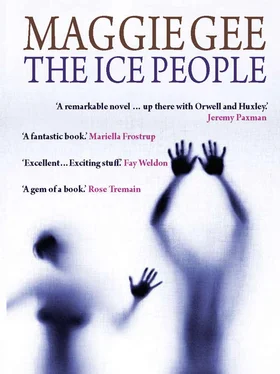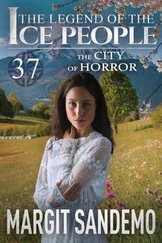Maggie Gee - The Ice People
Здесь есть возможность читать онлайн «Maggie Gee - The Ice People» весь текст электронной книги совершенно бесплатно (целиком полную версию без сокращений). В некоторых случаях можно слушать аудио, скачать через торрент в формате fb2 и присутствует краткое содержание. Год выпуска: 2008, Издательство: Telegram Books, Жанр: Фантастика и фэнтези, на английском языке. Описание произведения, (предисловие) а так же отзывы посетителей доступны на портале библиотеки ЛибКат.
- Название:The Ice People
- Автор:
- Издательство:Telegram Books
- Жанр:
- Год:2008
- ISBN:нет данных
- Рейтинг книги:4 / 5. Голосов: 1
-
Избранное:Добавить в избранное
- Отзывы:
-
Ваша оценка:
- 80
- 1
- 2
- 3
- 4
- 5
The Ice People: краткое содержание, описание и аннотация
Предлагаем к чтению аннотацию, описание, краткое содержание или предисловие (зависит от того, что написал сам автор книги «The Ice People»). Если вы не нашли необходимую информацию о книге — напишите в комментариях, мы постараемся отыскать её.
imagines an ice age enveloping the Northern Hemisphere. It is Africa’s relative warmth that offers a last hope to northerly survivors. As relationships between men and women break down, the novel charts one man’s struggle to save his alienated son and bring him to the south and to salvation.
Maggie Gee
The White Family
The Flood
The Ice People — читать онлайн бесплатно полную книгу (весь текст) целиком
Ниже представлен текст книги, разбитый по страницам. Система сохранения места последней прочитанной страницы, позволяет с удобством читать онлайн бесплатно книгу «The Ice People», без необходимости каждый раз заново искать на чём Вы остановились. Поставьте закладку, и сможете в любой момент перейти на страницу, на которой закончили чтение.
Интервал:
Закладка:
Wicca World stood in the elections. There must have been money behind them somewhere, because they bought screentime on several channels. Sarah didn’t stand as a candidate, but hovered in the background as Mother of the Party. Doubtless her old screen connections helped. She was interviewed several times, very upbeat. We were on the verge of a ‘caring revolution’ … Mother of the Party! Ha, I thought. I could tell the world a thing or two about her mothering.
We roared with laughter when one of their campaign films came on at the club. It showed radiant, kindly, softfocus women (I recognised Briony’s face among them) dancing in a caring ring, in green fields, around a herd of blonde children. The voiceover spoke about ‘revaluing nature’, ‘nurturing the future’; ‘the future is green’. We would ‘bloom again’ with the ‘cooling earth’. We would ‘give thanks to the Goddess’ for water (some footage of flowing rivers, with laughing women drinking from them), clean air (shots of blue sky, and clouds) and earth (a troop of women digging, with spades, old-fashioned twentiethcentury spades, in rich black earth, among redberried bushes. They looked very cheerful. Had they just buried their husbands?). Then the film came on to that vexed topic, Men. Some men, it seemed, had taken a wrong turning (sinister, repetitive music over shots of bald men in studded leather, bent over banks of flickering screens, blending into shots of other men whooping and yelling with glee as they played on a simulated weapons range — we had one at the club; I was a top scorer — while in a subliminal halfsecond image, two furtive men disappeared round a corner together, and the audience at the Scientists whistled and ‘Frohr’ed and catcalled and slapped one another with glee). But Wicca were at pains to say not all men were bad. Men were basically loving (now ‘L’après-midi d’un faune’ rose tenderly over a shot of Michelangelo’s David, his penis looking smaller and milder than usual, and another shot of Jesus, surrounded by children, with big kind eyes and flowing hair). Men had a part to play in Wicca too! If we voted for Wicca we voted for a future where contradictions could be reconciled, where hatred could be turned into love, Outsiders (who had votes) could be Insiders (shots of laughing actors playing Outsiders, not dirty and thin, as the real ones were, but brown and happy — thanks to Wicca? — being greeted and embraced on a fat woman’s doorstep); where the old could be young, the ill well, black white … The film returned to its opening shots, the ring of smiling, sunlit women, then panned out to show, all across the meadow, a motley collection of contented people representing every possible voting interest, many of them men, waving to the women (waving their children goodbye, I thought), showing support for the triumphant climax, as chords surged up under that throbbing, urgent, thrilling voice, which I suspected was Juno’s, saying ‘Vote for Wicca. Wicca Cares’ To my horror I realised what the music was. It was ‘Nessun Dorma’. Was that Sarah’s idea? Had she given away our special music?
Apart from that final act of treachery, I really enjoyed it. It was gross. We adored it. Someone pressed the ‘Recall’, and we watched it again. Only madwomen, we thought, would vote for them.
On Election Day, the Greek Sheet ’s early headline sneered ‘Votes for Wimmin!’ over photographs of women queuing to vote. The other parties were the usual crew, venal, arid, selfserving, hopeless. The Liblabs had amalgamated with the Conservers. There was no one to vote for. Men abstained in droves. We waited for the same grey frauds to be returned.
Something dreadful, mad, unspeakable happened.
The results came in. Wicca World had won. I couldn’t believe it, but the figures were there. We thought they were a joke, but they had won the election. ‘Wacky Witches Win!’ shrieked the Greek Sheet ’s final issue. We weren’t quite so clever as we thought.
Sarah was interviewed, looking tired and haggard but flushed with triumph under the lights, gabbling about nurturing nature, and I thought I spotted just a smidgin of panic, as if she hadn’t really expected this.
The postmortem told us the turnout was abysmal, ten or twelve-percent, I can no longer remember, threequarters of that female, with women voting overwhelmingly for Wicca. This seemed to me barely believable. I was sure there were still many sensible women who would never have fallen for Wicca’s tosh … Would they? The pundits said women wanted a change. Wicca ‘spoke to women’s spiritual needs’. They were ‘sick of arid materialism’. Yet to me they’d always seemed so practical, noticing that a floor needed cleaning, wiping surfaces, remembering bills, sending birthday presents, flushing loos, knowing from a baby’s congested face what type of thing had just leaked from its bottom … And they enjoyed it, surely. It was what women liked.
Or had men got it all wrong again?
In any case, now we were going to be punished. We were frightened, actually, as well as incredulous, because the Speakers still had some degree of power.
A succession of men went on screen to suggest a campaign of male civil disobedience, withholding communications tax or Comtax (our last remaining tax, which subsidised the net, Leamonline, Speakers’ Hour and ScreenRecycle) on the grounds that we had no Speaker representation. But Wicca said they spoke for all, for woman in man and man in woman, the goddess in god and god in the goddess, which wasn’t an easy line to argue with. Men held mass switch-offs during Speakers’ Hour and swamped Wicca’s phone lines with angry phone calls, but the only serious effect of the campaign was the deficit to Comtax. The Witches had announced their intention to raise it by twentyfivepercent, to fund more nursery schools (‘Catch ‘em Young!’, the Greek Sheet roared. ‘Witches Snatch Our Babies’). But the men refused to pay en masse, and as one man remarked of the increases, there were hardly any babies for the witches to school.
And that was at the root of all that happened, of course. That’s why men and women hated each other.
The kids had been the glue that held us together. When babies stopped coming, the men got the blame. The women felt thwarted, and abandoned us. And so we moved further and further apart, and turned into parodies of ourselves — the shavenheaded, giggling, machineloving men, the shorthaired, shortfused, furious women, shriving themselves with nature worship.
They didn’t want us. We were no good. And we believed them, deep inside.
The women seemed to hate my whole sex, which was hard. The things that made my body a man’s, my balls, my penis, my male voice — my size, my sweat, my manliness. The things that had denied them what they craved. And I think they began to hate their sons, the few there were, the weakling boys. They called Luke ‘Lucy’ … godforgive them.
I couldn’t forgive her that for years.
After the elections, we expected summer, but there was a curious patch of real cold. The summer scanties were in the shops, but people were walking around in coats, some of them heirlooms, twentieth-century furs that hadn’t been out of the cupboard for decades, and laughingly showing off the goosepimples they were feeling now for the first time. People began to wish for summer as they must have done in my parents’ childhood. We thought it was a little freak, of course, a byblow of the general miraculous cooling that had come to save us from global heat death. And spring did eventually arrive, at roughly the time when summer should have done, and then it got hot, as it always did, and we all forgot it had ever been different.
It was July or August. I had stayed late at work. I was involved in a project to design a mouthwash which was a solution of minute nanomachines, each of which would clean and polish the teeth as it fed off the plaque and gunge on the surface. It would make normal tooth-brushing obsolete, and might even make me rather rich if I were lucky enough to scoop that year’s ‘Hundredpercent Prize’, a hundredpecent bonus on salary awarded for ‘significant innovation’. I suppose there wasn’t that much ‘significance’ in freeing us from one of our last bits of labour, but I had been told I was in line for the prize. Perhaps they meant, ‘makes a significant profit’, which this certainly would, if I could crack a few problems. I was having trouble dealing with the chemists who were supposed to be coming up with the flavour, and I’d started to wonder, not entirely idly, if they were being nobbled by toothbrush manufacturers. That evening I was frustrated, or bored … so I started browsing, which I usually made a big effort not to do, in the lab.
Читать дальшеИнтервал:
Закладка:
Похожие книги на «The Ice People»
Представляем Вашему вниманию похожие книги на «The Ice People» списком для выбора. Мы отобрали схожую по названию и смыслу литературу в надежде предоставить читателям больше вариантов отыскать новые, интересные, ещё непрочитанные произведения.
Обсуждение, отзывы о книге «The Ice People» и просто собственные мнения читателей. Оставьте ваши комментарии, напишите, что Вы думаете о произведении, его смысле или главных героях. Укажите что конкретно понравилось, а что нет, и почему Вы так считаете.












